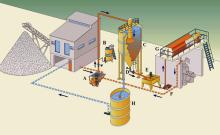
Inclusion of the extractive industries in the recently rejected Soils Directive had threatened the aggregates sector with double legislation. Claire Symes reports
Protecting the environment is a critical objective for the quarrying industry in Europe and few could argue against new legislation to further this aim. But while the recently rejected Soils Directive was designed to protect the environment, the potential implications for the aggregates sector were huge.
The directive was first proposed in September 2006 as a thematic strategy for soil protection with a legislative framework for the sustainable use of soil. The basis of the directive lays in farming issues - such as use of pesticides - but an annex was added listing potentially polluting industries.
"One of the industries listed was mineral extraction," explained Quarry Products Association director general Simon van der Byl. "While the industry is keen to promote its good environmental stewardship, the act of quarrying does not present a significant risk to the pollution of soils." The draft directive was put before parliament in November last year and, despite lengthy negotiations by the Portuguese presidency to find a resolution, the directive was thrown out at the subsequent meeting of the Council of Environment Ministers in December 2007. The directive was rejected following blocking votes from Austria, France, Germany, the Netherlands and the UK.
However, despite the rejection of the draft, the new Slovenian presidency has announced plans to re-introduce the directive as a result of Eastern European backing for the legislation. At present it is unclear if the directive will be modified or redrafted to take account of the national objections but the QPA has vowed to continue campaigning against the proposal.
According to the QPA, adoption of the directive in its current form would create additional and unnecessary legislative hurdles for the quarrying sector in many member states.
"The main interaction of quarries with soils is during stripping when a quarry operator opens up a new resource," explained van der Byl. "But in most cases the operator stockpiles the material for restoration works and husbandry of this is already legislated for under the Mining Waste Directive." Including this under the soils directive would mean double legislation for the quarry sector, plus the added burden of providing a soils status report. According to van der Byl, the whole directive seemed to be against the grain of EU legislation. "After all soil is not commonly exported between countries so it seems strange for it to be treated as an EU issue in this way," he said.
The QPA first became aware of the potential impact of the new directive on the aggregates industry last summer and started to take action to try and block the adoption of the directive.
"We met with the directive's rapporteur Cristina Gutiérrez-Cortines and various MEPs from the environmental committee to talk about the potential problems arising from including mineral extraction in the directive," said van der Byl.
Simply removing mineral extraction from the directive was not possible due to legislative issues but the QPA, with the support of the
"Apart from the implications of the directive, we were concerned about the prescriptive nature of it," said van der Byl. "The structure of the directive meant that it would not be up to the member states to decide if existing legislation already sufficiently covered the issue.
"The directive was well supported by some of the new member states which seem to want to use the leverage of EU legislation on this issue to force change rather than introduce national policies. However, for the quarrying sector, it may well be unnecessary as a driver because the growth is demand in these countries is attracting investment and expansion from many of the big multinational quarry operators.
"Through this consolidation, they are bringing management ethics from more established member states and with it higher standards of health and safety, environmental practice and operational techniques. Through this process, self regulation will bring better, more workable results than imposed regulation."
Next stage
Although the draft directive has been rejected and is on the legislative back-burner, the plans of the Slovenian presidency suggest that it could be resurrected.
"Some of the countries that blocked the adoption support the idea of a soils directive in principle because of the need to improve soil protection but did not think that the draft took account of existing knowledge," said van der Byl. "The French are in favour of the soil protection framework but objected to it on the grounds that it did not sufficiently take account of experience of contaminated land." "If we can get mineral extraction removed from the annex before the directive is presented before the






